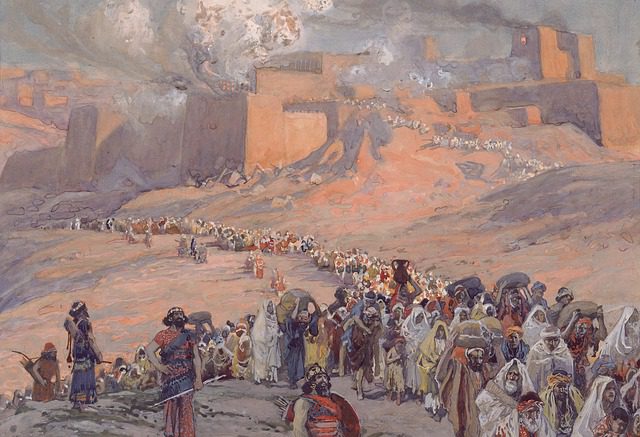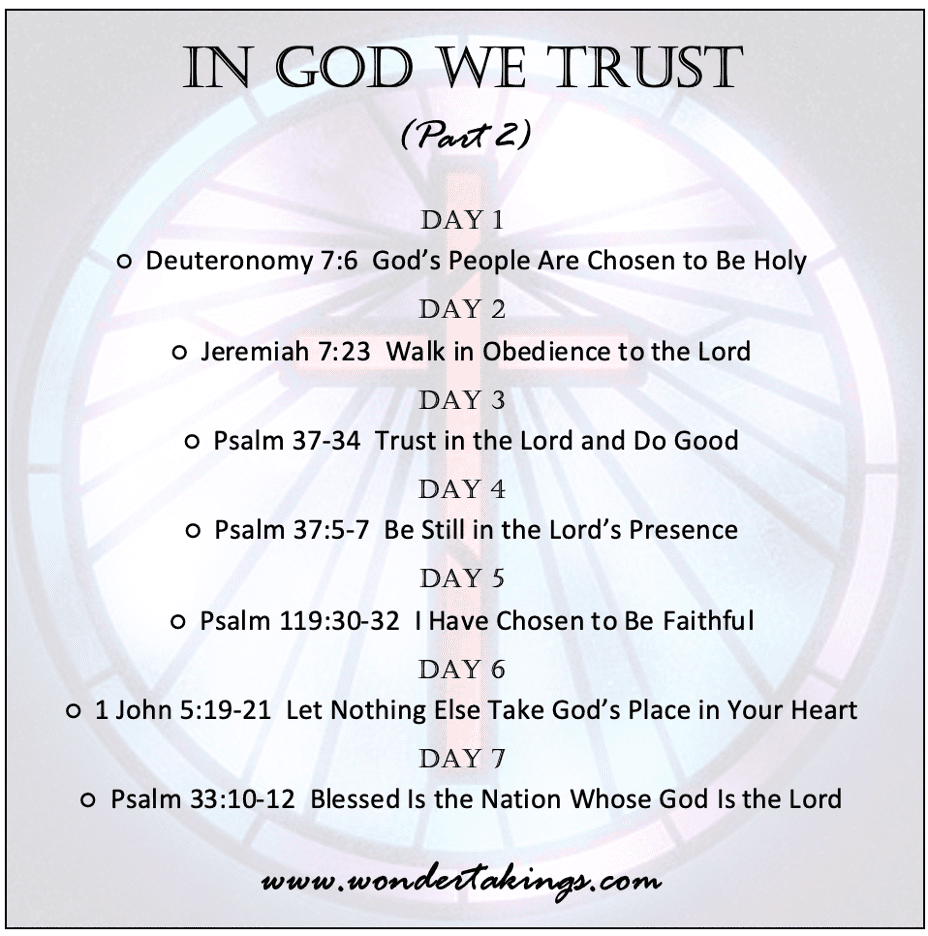In God We Trust (Part 2)
“Hezekiah died, and his son Manasseh became the next king.”
2 Kings 20:21 NLT

“Just as the Lord destroyed the other nations for you,
Deuteronomy 8:20 NCV
you can be destroyed if you do not obey the Lord your God.”
Last week we looked at the story of King Hezekiah and how his faithful obedience to God saved the kingdom of Judah from the powerful Assyrian army. Hezekiah trusted in God, and throughout Hezekiah’s lifetime, God was with him and the people of Judah. Unfortunately, Hezekiah’s son did not follow in his father’s footsteps or heed God’s warnings about the consequences of disobedience . . .
Our plan for 2023 is to journey through The NeverEnding Story of the Bible and discover how we fit into it along the way. Our plan for this year is loosely based on The Story, an abridged chronological version of the Bible, and the accompanying study guide The Heart of the Story by Randy Frazee.
Here is where we are in The Story:
MOVEMENT TWO: The Story of Israel (Genesis 12-Malachi)
Chapter 16 – The Beginning of the End (of the Kingdom of Israel)
This chapter in The Story covers 2 Kings 17-19 and Isaiah 3, 6, 13-14, 49, & 53. As we mentioned last week, this chapter begins with the fall of the northern kingdom of Israel and the deportation of its citizens to Assyria. The smaller southern nation of Judah was spared this fate while Hezekiah — a good and God-fearing king — reigned. But sadly, after Hezekiah died, his son Manasseh took the throne and undid all the good things his father had done:
“Manasseh was twelve years old when he became king, and he reigned in Jerusalem fifty-five years. His mother was Hephzibah. He did what was evil in the Lord’s sight, following the detestable practices of the pagan nations that the Lord had driven from the land ahead of the Israelites. He rebuilt the pagan shrines his father, Hezekiah, had destroyed. He constructed altars for Baal and set up an Asherah pole, just as King Ahab of Israel had done. He also bowed before all the powers of the heavens and worshiped them.”
2 Kings 21:1-3 NLT
Manasseh was very young when he took over, and he apparently did not have a good understanding of the true origin of his power. He appeared to be a cocky kid who thought he had no need for his father’s faith in the one true God of Israel. Maybe he thought his father was foolish for worshiping only one God. Maybe he thought Judah’s previous military successes came from their physical strength instead of from God’s power. Who knows? But whatever the reason for his disobedience, it had dire consequences, not just for him, but for his people as well.
“The Bible describes Judah under Manasseh as being more evil than the foreign nation that God had previously destroyed. . . . God raised up the Assyrian army to capture Manasseh in the most humiliating manner. They put a hook in his nose, bound his hands and feet with shackles, and led him away in plain sight of his subjects. Then they took him to Babylon and handed him over to become a prisoner in that pagan nation. Eventually, years after Manasseh’s death, the Babylonians destroyed the capital city of Jerusalem and deported Judah’s residents to Babylon.”
Randy Frazee, The Heart of the Story

“Because the Lord was very angry with Israel, he swept them away from his presence. Only the tribe of Judah remained in the land. But even the people of Judah refused to obey the commands of the Lord their God, for they followed the evil practices that Israel had introduced. The Lord rejected all the descendants of Israel. He punished them by handing them over to their attackers until he had banished Israel from his presence.”
2 Kings 17:18-20 NLT
Maybe Judah thought they were safe since they had been faithful in the past. After all, they were special. They were God’s chosen people. More than that, they were the tribe of David, and God had promised David: “Your house and your kingdom will continue before me for all time, and your throne will be secure forever” (2 Samuel 7:16 NLT). So, they should be fine, right? Maybe they thought they could do whatever they wanted since God would never break His promise. But they didn’t understand the full meaning of God’s promise. And they didn’t fully realize that God could still keep His promise to David even if He let their nation be destroyed by Babylon. God is in charge, and He can fulfill His promises however and whenever He chooses, with or without us. Our job is not to figure everything out or try to second-guess God. Our job is simply to obey Him.
After everything that had already happened to God’s chosen people in the past, after all the warnings God had sent, and after all the lessons they should have learned, Manasseh still led his people back into idolatry. And God decided, enough is enough! God’s people were called to be holy. That was the whole point of their existence as a nation. They were to be an example to other nations by demonstrating God’s character and by worshiping Him alone, not by following the evil practices of the nations around them. But they just wouldn’t listen. And they suffered the consequences.
” . . . there is another dimension to this story that haunts me, and it has to do with the effect that disobedience has on nations. God clearly punished the bad kings for their wickedness, but he also punished both nations, Israel and Judah. He even allowed two pagan nations — Assyria and Babylon — to play crucial roles in punishing those nations that were especially chosen by God to carry out his divine plan for all mankind. I don’t think I’m reading too much into this to suggest that God holds both individuals and nations accountable.”
Randy Frazee, The Heart of the Story

“God waited patiently for 208 years before he finally decided he could not allow his nation to continue rejecting him and his ways. Will the day come when he runs out of patience with the United States and other nations in our world? The United States has been in existence for roughly this same fatal time span of time. I don’t have the answer, but the idea that this could happen ought to motivate all of us who love and trust God to pray for our nation . . . .”
Randy Frazee, The Heart of the Story
The Israelites didn’t place a high enough priority on being obedient to God, and they got distracted by the shiny gods of their neighbors. They rejected the Lord and His ways. So, God finally gave them what they wanted: He let them do things their own way and face the consequences on their own. The same thing could happen to us as individuals and as a nation. Our money may still say “In God We Trust”, but do we make trusting God a priority? Or do we get distracted by the “shiny gods” all around us? Are we driven by faith, or are we driven by wealth, success, and the pursuit of happiness? Nothing’s wrong with wealth, success, or happiness, but pursuing them shouldn’t be our priority. We may not bow down to wooden statues, but anything that takes God’s rightful place in our hearts becomes an idol. And as the Israelites learned very painfully, we can’t worship idols and also worship God. We also cannot rely on our own strength to save us. Our nation may be considered a superpower, but that means nothing compared to the power of God.
As we learn to seek first the kingdom of God and live the way He wants us to live, He will give us everything else we need (Matthew 6:33). God will take care of us, and He is the only One we can count on. So let’s learn to trust Him every day instead of trying to do things on our own. I’m talking mostly to myself here! There have been times I’ve fought against God’s desires for me and insisted on doing things my own way. And He gave me what I wanted, consequences and all. Like the stubborn Israelites, I seem to need to keep learning this lesson the hard way. I’m trying to do better. I’m trying to remember that God’s way is always best, and trusting Him should always be my priority. It’s hard sometimes, but I’m not going to give up trying. My hope and prayer is that you will not give up trying either. Because collective trust in the Lord begins with individual trust in the Lord. And, as Psalm 33 tells us, blessed is the nation whose God is the Lord!
“When those of us who believe in God live the way he calls us to live,
Randy Frazee, The Heart of the Story
our nation can be transformed . . . .”
This week’s Scripture passages focus on faith, trust, and obedience. We must choose every day to be faithful to God and keep Him first in our hearts. As we make a habit of spending quiet time with Him, being still before Him, and listening for His voice, we learn to trust Him more and more. We begin to shine with His light. And we make ourselves available to be His instruments in the world so that others will learn to trust in Him, too!

“But you are a chosen people, a royal priesthood, a holy nation, God’s special possession, that you may declare the praises of him who called you out of darkness into his wonderful light.”
1 Peter 2:9 NIV

References:
- Frazee, Randy. The Heart of the Story: Discover Your Life Within the Grand Epic of God’s Story. Zondervan, 2017.
- The Story: Read the Bible as One Seamless Story from Beginning to End. Rev. ed., Zondervan, 2008.
Images:
- “In God We Trust” featured image by Kelly Sikkema on Unsplash
- Warning image by Clker-Free-Vector-Images from Pixabay (edited)
- Babylonian Exile image by Pascal from Pixabay
- Money image by Karolina Grabowska: https://www.pexels.com/photo/ten-dollars-with-inscription-and-building-4386156/
- Stained Glass image by Jeff Jacobs from Pixabay (edited)
- Coffee Mug image by Jessica Lewis: https://www.pexels.com/photo/black-mug-with-religious-text-from-holy-bible-4200823/